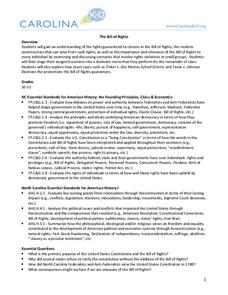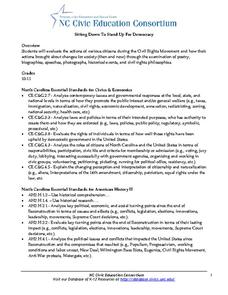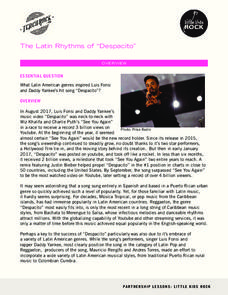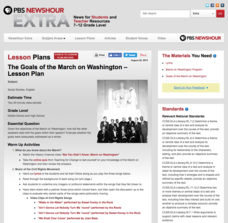Odell Education
Making Evidence-Based Claims: Grade 8
American women have been working toward equal rights since the ink dried on the Declaration of Independence. Focused on the words and actions of Sojourner Truth, Shirley Chisholm, and Venus Williams, a language arts lesson takes eighth...
Carolina K-12
On the Road to Revolution: Creating a Living Timeline
Divided into nine topic groups, from the Proclamation of 1763 to the Battles of Lexington and Concord, your young historians research significant events on the road to the American Revolution, then create a two- to three-minute sketch...
Carolina K-12
Trench Warfare in World War I
Class members engage in an experiential activity and research topics related to the exercise to gain a deeper understanding of the conditions in the trenches during World War I. A potent and thought-provoking activity.
Center for Literacy and Disability Studies
The Bill of Rights
Explore the Bill of Rights in-depth with this resource packet that includes the complete text of the document, scenarios and discussion questions for each amendment, role-playing activities, exercises, questions for a Socratic seminar, a...
University of North Carolina
Sitting Down To Stand Up For Democracy
Boycotts and bus rides, sit-ins and speeches. The focus of this amazing resource is on those people who were willing to put themselves at risk to take a stand for their belief in equal rights for all. A must-have for your curriculum...
University of North Carolina
The Narrative of the Life of Frederick Douglass, an American Slave
After reading excerpts from Frederick Douglass' autobiography, pupils will draw on what they've learned about the cruelty of slavery to write and present an anti-slavery speech or editorial.
UNICEF
Self and Interpersonal Relationships Theme Unit
A key goal of social-emotional learning is to help young people develop healthy attitudes towards themselves and others. A 173-page curriculum guide provides step-by-step lessons that are richly detailed, carefully scaffolded, and...
PBS
To Kill a Mockingbird Teacher's Guide
If you're planning a unit on To Kill a Mockingbird by Harper Lee, don't pass this resource by! It includes thorough discussion questions and vocabulary from the novel, research opportunities, and writing prompts to extend learning...
Echoes & Reflections
Jewish Resistance
Resistance to the Holocaust took on many forms. Learners explore the passive and active resistance of Jewish people who continued their practices and observances, as well as organized resistance against the evils of the Nazis. An...
Echoes & Reflections
The "Final Solution"
Nazi policies shifted from deportation and imprisonment to extermination of the Jewish people in death camps in the "Final Solution." Learners examine photos of artifacts, read poetry written by survivors, analyze testimony from...
Echoes & Reflections
Survivors and Liberators
The end was just the beginning. The period immediately after the end of World War II and the Holocaust is often called "The Return to Life" as survivors looked to reunite and recreate broken families and shattered lives. A two-lesson...
Echoes & Reflections
Nazi Germany
The Holocaust was an evolution of anti-Semitism, scapegoating, and targeted violence against Jews with Nazi policies. A resource unpacks the escalation in violence, along with the erosion of democratic institutions, during the 1930s....
Echoes & Reflections
The Children and Legacies Beyond the Holocaust
Using video testimony, primary source documents that detail international agreements, and structured discussions, learners consider the precarious position of children during the Holocaust and other international conflicts, and how to...
Echoes & Reflections
Rescuers and Non-Jewish Resistance
What does it mean to be a rescuer during the time of the Holocaust? Learners consider the role of those who resisted the Nazi invasions, including hiding Jewish people, throughout Europe. Activities include listening to the testimony of...
Echoes & Reflections
The Ghettos
Young historians examine primary sources, including diaries, poems, and photographs, to consider the conditions in the ghettos and how they fit into the escalation of the Third Reich's plot against the Jewish people.
Echoes & Reflections
Studying The Holocaust
While many young scholars are familiar with the Holocaust, they may not understand the specific history that led to the unprecedented atrocity. The first lesson in the unit helps teachers gauge their pupils' background knowledge. A...
California Department of Education
Evaluating Web Sites
If it's on the Internet, it must be true—right? How can someone tell if a website contains less-than-truthful information? Savvy surfers evaluate sources in the fifth of a six-part college and career readiness instructional activity...
Little Kids Rock
The Latin Rhythms of “Despacito”
When you hear the first few beats of "Despacito," the unrivaled Latin pop hit of 2017, you can't keep your feet from moving! A music analysis lesson plan examines the intoxicating hit by Luis Fonsi and Daddy Yankee and introduces the...
Constitutional Rights Foundation
If Men Were Angels: Teaching the Constitution With the Federalist Papers
Much like the methods of group work, the writers of the Federalist Papers worked together to advocate for their viewpoints against the anti-federalists. The resource enables learners to break into small groups and conduct research before...
PBS
The Goals of the March on Washington
Who else had a dream other than Martin Luther King, Jr.? Pupils explore civil rights leaders in a fourth lesson out of a series of five about people who paved the way to freedom for African Americans. The inquiry-based unit has your...
American Press Institute
Introductory News Literacy
Aspiring journalists learn about media literacy, journalism, and the press. Units come complete with handouts, assignment rubrics, notes, and extension suggestions. Each unit also comes with a list of vocabulary words and learning...
PBS
Master of the Airwaves: How FDR Used Radio to Ease the Public’s Fears
The political and economic climate during the 1930's was uncertain and tumultuous. But Americans' minds and hearts were eased with the reassuring words of their president, Franklin D. Roosevelt, and addresses over the radio. High...
PBS
Stories of Painkiller Addiction: Myth or Fact
Are opioids the most abused drug after marijuana? How hard is it for young people to obtain painkillers without a prescription? Middle and high schoolers explore the growing epidemic of opioid addiction with a lesson that prompts them to...
PBS
Stories of Painkiller Addiction: Learning About Opioids
Feeling high is not the only side effect of abusing prescription opioids. Middle and high schoolers learn more about specific painkillers, including Fentanyl, Oxycodone, and Clonazepam, as well as their common brand names and extensive...

























